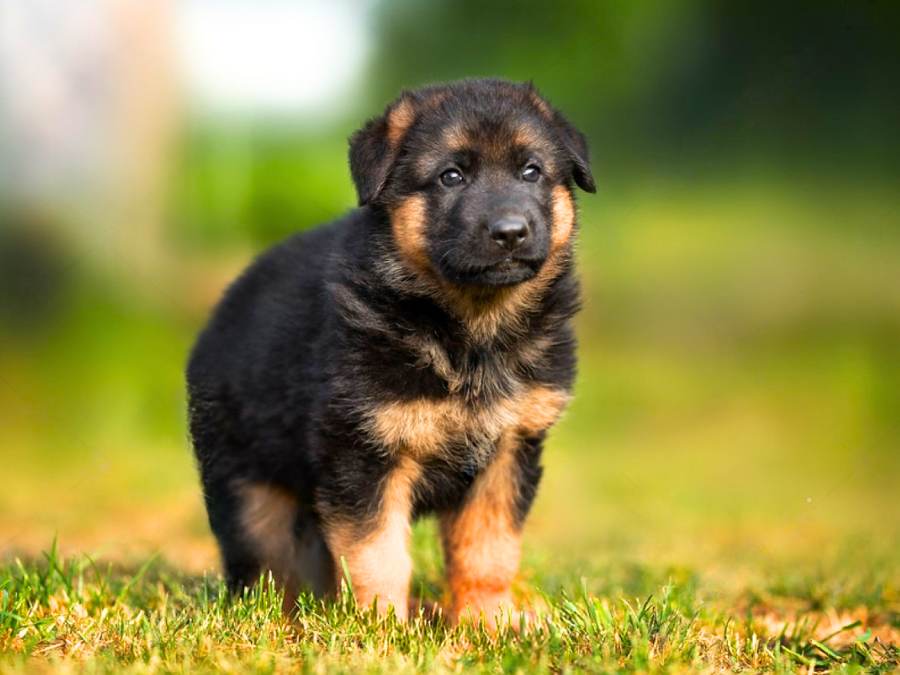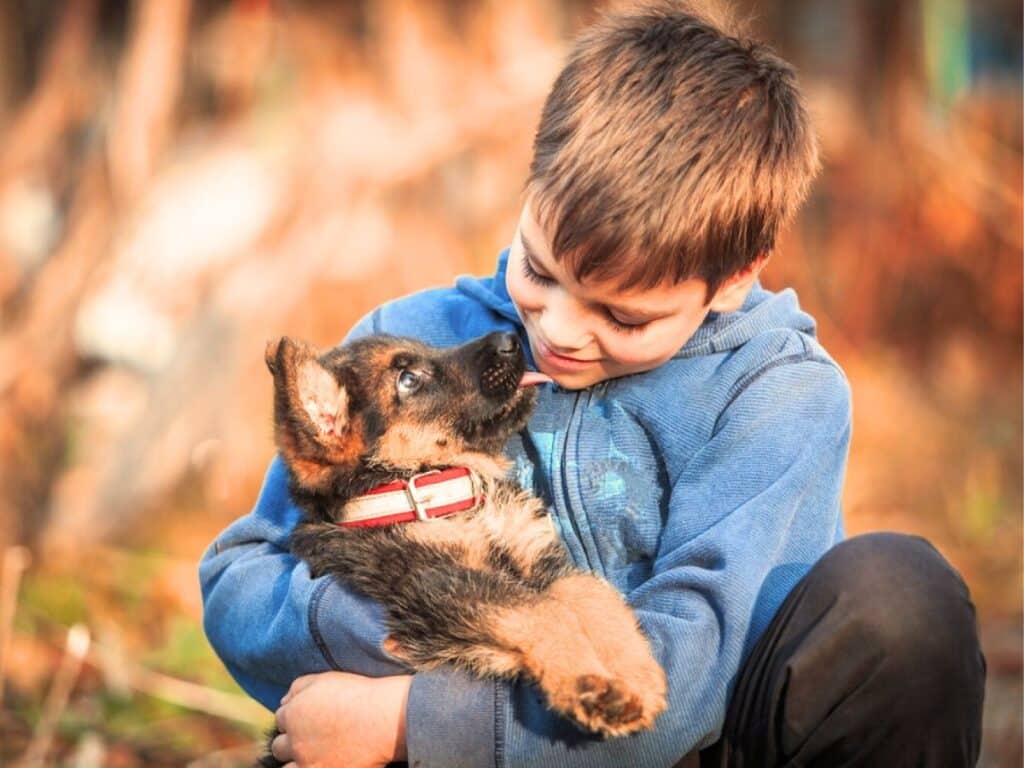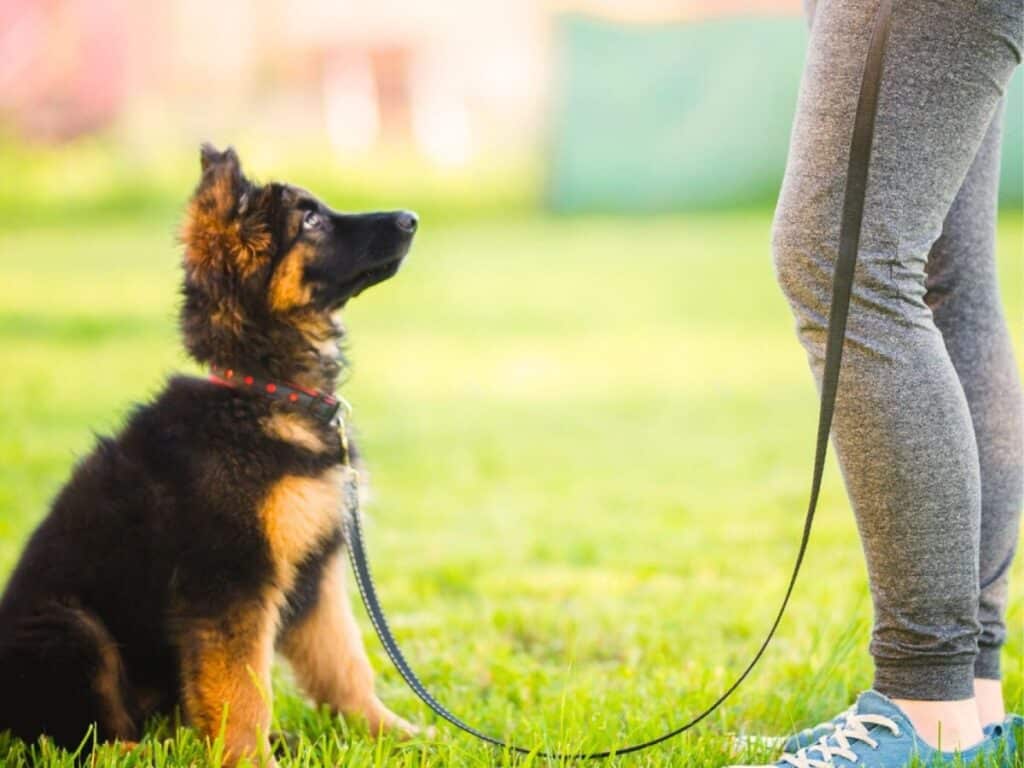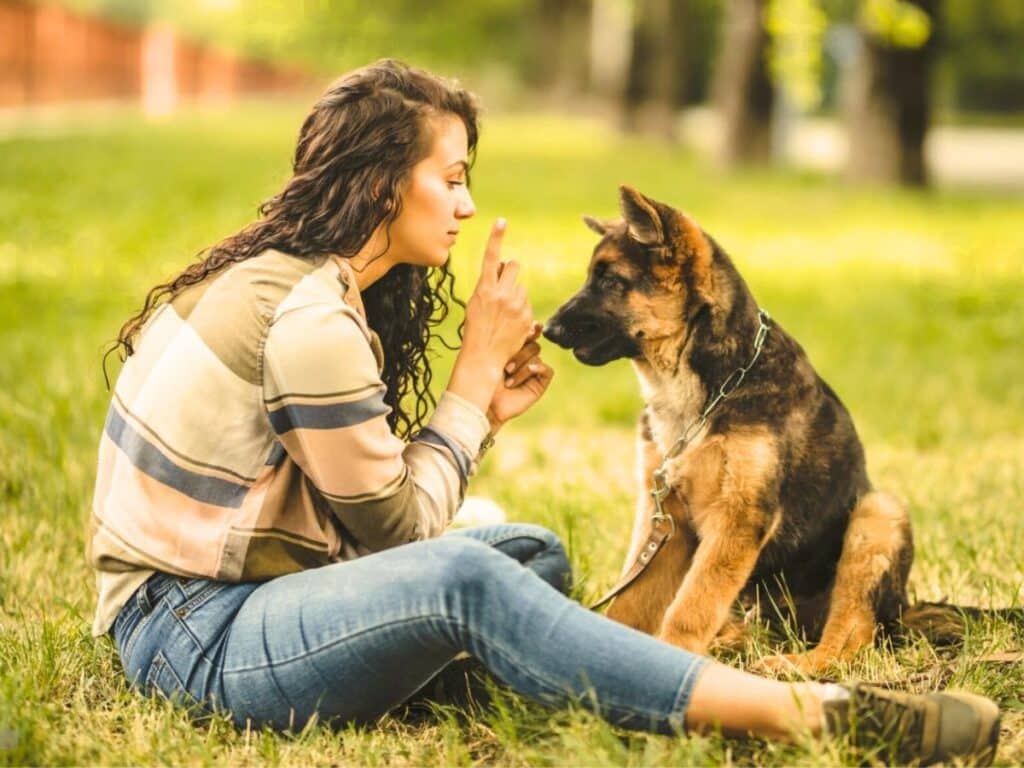Potty training a German Shepherd puppy is a significant milestone in both your life and that of your furry companion. It’s a process that requires time, understanding, and a lot of patience. If you’re feeling overwhelmed or discouraged, know that these feelings are entirely normal, but also remember that success is not only possible—it’s guaranteed with the right approach.
Just as young children take time to learn and understand their own bodily needs, puppies are no different. They’re learning to adapt to their new environment and the expectations you set for them.
This comprehensive guide will walk you through every step to effectively potty train your German Shepherd pup, offering insights and practical tips to ensure your puppy becomes well-trained in no time.
Understanding Puppy Limitations & Behavior
Your Puppy Has Limited Bladder Control!
When puppies are born, their ability to control when and where they relieve themselves is not fully developed.
This control begins to improve as they grow older, usually around the age of 4-6 months. Like human infants, puppies’ bladders are small, and they need to urinate frequently.
As they age, not only does their bladder capacity increase, allowing them to hold urine for longer periods, but they also develop stronger muscle control.
This development is a natural process that occurs as part of their physical growth and cannot be rushed.
In the meantime, frequent potty breaks, consistent scheduling, and positive reinforcement for successful outdoor bathroom trips are key strategies in supporting your German Shepherd puppy’s natural development.

How to Know When Your Puppy Needs to Go
Puppies are naturally clean animals and prefer to eliminate away from their living and eating areas. However, they also have small bladders, requiring them to relieve themselves frequently.
One of the keys to successful potty training is learning to interpret your puppy’s signals that it’s time to go outside.
These cues can be subtle, especially in the early stages of training, but with close observation, you’ll soon be able to recognize them.
Here are some common signals that puppies display when they need to relieve themselves:
Sniffing: Puppies often sniff the ground intently when they’re searching for a spot to urinate or defecate. This behavior is instinctual and serves as a clear indicator that it’s time for a quick trip outdoors.
Circling: Circling is another sign that your German Shepherd might need to go. Before settling on a spot to relieve themselves, puppies will often walk in circles, sniffing the ground. This behavior can sometimes be accompanied by squatting, which means they’re getting ready to go.
Whining or Barking: Some puppies may vocalize their need to go outside by whining, barking, or scratching at the door. These sounds are a form of communication, indicating their discomfort or the urgency to relieve themselves.
Restlessness: A puppy that suddenly becomes restless, pacing back and forth or trying to get your attention, may be signaling that they need to go. This restlessness is their way of saying they can’t hold it much longer and need to be taken outside.
Responding to the Signs
Once you recognize these signals, it’s crucial to respond quickly and consistently by taking your German Shepherd to their designated potty area.
This consistency not only helps prevent accidents but also reinforces the idea that there is a specific place for them to relieve themselves.
Over time, as your puppy learns that they can trust you to meet their needs, these signals will become more pronounced and easier to recognize.
Potty Training Tips For Success
Creating a consistent schedule
Establish a regular schedule for feeding, playing, and potty breaks. Puppies thrive on routine, as it helps them understand what to expect and when.
A consistent schedule not only aids in regulating their digestive system but also teaches them that there are specific times for going potty.
Start by taking your puppy out:
- First thing in the morning
- After every meal
- Following naps
- After playtime
- Right before bedtime
For young German Shepherd puppies, you’ll need to take them out every 2-3 hours, including during the night. As they grow older and gain more control over their bladder, these nighttime outings can gradually be reduced.

Choosing the right spot
Select a specific area outside where you want your GSD pup to go potty and consistently take them to this spot. This helps your puppy associate this area with going to the bathroom.
Use a consistent command like “Go potty” every time you’re in this area to reinforce the behavior. Over time, your puppy will learn to go to this spot when they need to relieve themselves.
Use a crate to potty train your GSD
A crate mimics a den-like environment that a puppy naturally seeks for security and rest. Most puppies will avoid soiling their sleeping area.
Using a crate teaches your puppy to hold their bladder and bowels until you can take them outside to their designated potty area.
Ensure the crate is large enough for your GSD puppy to stand, turn around, and lie down, but not so large that they can use one end as a bathroom.
Crate training should be done gradually, ensuring that your puppy views the crate as a safe and comfortable space, not a punishment.
Use potty bells
Teaching your German Shepherd puppy to ring the potty bell when they need to go outside can be incredibly useful.
This can be done by teaching your puppy to ring the bell with their paw or nose when they need to go out, or by encouraging them to stand by the door and wait.
I found this best-selling potty bell on Amazon, check it out!
Monitor food and water intake
Keep an eye on how much your puppy eats and drinks and at what times. Setting specific times for meals instead of free feeding helps regulate their bathroom habits, making it easier to predict when they’ll need to go out.
Avoid using pee pads
Using pee pads encourages your puppy to eliminate indoors, which contradicts the primary goal of potty training: teaching your dog to only go outside.
This habit can be hard to break, especially if your puppy becomes accustomed to the convenience of relieving themselves inside at any time.
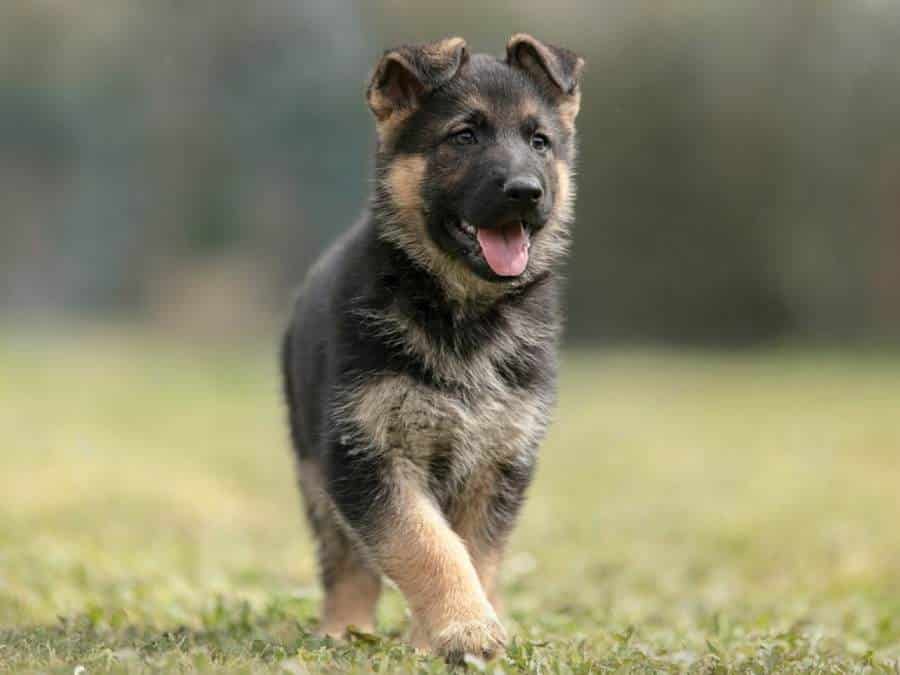
A Typical Day of Potty Training: Step-by-Step
Potty training is a day-long commitment that requires consistency and patience. A typical day in the life of potty training involves multiple trips outside, vigilance, and lots of praise.
Here’s what a day might look like:
Morning
- First thing in the morning: Start the day by taking your puppy outside as soon as they wake up. Puppies often need to relieve themselves immediately after waking up. Use a cheerful voice to say your potty command, like “Let’s go potty!” This sets a positive tone for the day.
- After breakfast: Eating stimulates the digestive system, so take your German Shepherd puppy out 5 to 30 minutes after eating. Younger puppies may need to go almost immediately, while older puppies can wait a bit longer.
- Mid-morning break: Offer a mid-morning bathroom break to help your puppy maintain a routine. This is especially important if they’re active and play during the morning hours.
Afternoon
- After lunch: Similar to after breakfast, take your puppy out shortly after their lunch. This helps reinforce that going outside after meals is part of their routine.
- Afternoon breaks: Depending on your puppy’s age and bladder control, they may need one or two afternoon bathroom breaks. Use these opportunities for short play sessions outside as well, which can help with both potty training and energy management.
Evening
- After dinner: Ensure your puppy goes out after their last meal of the day. This is crucial for preventing nighttime accidents.
- Evening play and last call: Engage your German Shepherd puppy in some light play in the evening to tire them out for bed. Offer a final potty break right before bedtime. This last outing is critical to help them through the night without accidents.
Throughout the Day
- Observation and cue recognition: Keep an eye on your puppy for signs they need to go out — sniffing, circling, whining. Immediately take them outside if you notice these behaviors.
- Consistency and praise: Use the same potty command and take your puppy to the same spot each time. Offer lavish praise and a treat immediately after they go potty outside to reinforce the behavior.
Tips for Success
- Adjust Schedules as Needed: Be prepared to adjust your puppy’s potty break schedule as they grow and their bladder control improves. They’ll gradually need fewer breaks during the day.
- Nighttime Considerations: Young puppies may need a bathroom break during the night. If your puppy whines or seems restless, take them out for a quick, quiet potty break, then back to bed.
A day of potty training is filled with repeated actions, patience, and lots of encouragement. By sticking to a consistent schedule and responding to your German Shepherd puppy’s needs, you’ll build a strong foundation for a well-trained adult dog.
How to Handle Accidents
Despite your best efforts in potty training, accidents inside the house are bound to happen. How you respond to these incidents can significantly impact your puppy’s learning and the overall success of the training process.
Here’s how to handle accidents constructively and effectively:
Stay calm and avoid punishment.
It’s natural to feel frustrated or disappointed when your puppy has an accident indoors, but it’s crucial to keep your cool.
Yelling, scolding, or punishing your puppy can lead to fear and confusion.
Puppies do not understand punishment after the fact, and negative reactions can make them anxious about going potty in front of you, potentially leading to more accidents.

Cleanup immediately.
Use an enzymatic cleaner specifically designed for pet messes. These cleaners break down the bio-enzymes in the urine or feces, effectively removing the scent and discouraging your puppy from marking the same spot again.
Reflect on the cause.
After cleaning up, take a moment to consider why the accident happened. Did you miss your puppy’s cues that they needed to go outside? Was there a change in the routine, or did it happen after a particularly exciting or stressful event? Understanding the cause can help you adjust your approach and prevent future accidents.
Increase supervision and consistency.
If accidents become frequent, it may be a sign to increase supervision and decrease the time between potty breaks. Keep your German Shepherd puppy in the same room with you so you can monitor their behavior more closely and catch cues that they need to go.
Use confinement and close monitoring.
Consider using a crate or confining your puppy to a smaller area of the house when you’re not able to supervise them directly.
This utilizes their natural instinct to keep their sleeping area clean and can help prevent accidents. But, never use the crate as a form of punishment.

Why Puppies Have Accidents
When potty training a puppy, accidents are an inevitable part of the process.
Here are some common reasons why puppies may have accidents indoors:
Lack of consistency and routine
A lack of consistent scheduling for feeding, potty breaks, and exercise can confuse puppies, making it harder for them to learn when and where it’s appropriate to relieve themselves.
Incomplete training or understanding
Potty training is a gradual process, and some puppies take longer than others to fully grasp the concept. If training is rushed or inconsistent, your German Shepherd puppy may not have fully learned the desired behavior.
Anxiety or stress
Changes in the environment, loud noises, new people, or other stressors can lead to accidents. Puppies are sensitive to their surroundings, and anxiety can disrupt their potty training progress.
Medical issues
If your German Shepherd pup suddenly starts having accidents after previously making progress in potty training, it could be a sign of a medical issue, such as a urinary tract infection, gastrointestinal upset, or other health concerns.
In such cases, it’s important to consult with a veterinarian to rule out any underlying medical conditions.
Inadequate supervision or opportunities
Puppies have small bladders and need frequent opportunities to go outside. If they’re left alone for too long without a chance to relieve themselves, accidents are more likely.
Overexcitement or submissiveness
Some puppies may have accidents when they’re overly excited or feeling submissive. This can happen during playtime, when greeting people, or in response to scolding.
Marking behavior
Though more common in adult dogs, some German Shepherd puppies may begin marking territory with urine. This behavior is different from accidents due to incomplete potty training and may require different strategies, including neutering or spaying, to address.

When to Seek Help
While potty training can be a challenging process, most issues can be resolved with patience, consistency, and the right strategies. However, there are situations where seeking help from professionals might be necessary.
Persistent accidents despite consistent training
If you’ve been consistently applying potty training techniques without improvement or if your puppy seems to regress for no apparent reason, it might be time to consult with a professional dog trainer.
A trainer can offer personalized advice and strategies tailored to your puppy’s specific challenges, potentially identifying issues in the training process or in the puppy’s environment that you might have overlooked.
Signs of anxiety or behavioral issues
If your German Shepherd puppy’s accidents are accompanied by signs of anxiety, fear, or other behavioral changes, such as excessive barking, destructive behavior, or withdrawal, seeking the advice of a veterinarian or a dog behaviorist is crucial.
Medical concerns
Sudden increases in accidents, especially if your puppy was previously making progress, could indicate a medical issue. Symptoms like straining to urinate, changes in appetite, lethargy, or unusual stool can be signs of health problems requiring immediate veterinary attention.
Final Remarks
Remember, the key to successfully potty training your German Shepherd puppy is positive reinforcement—praising and rewarding your puppy for good behavior. Accidents are just part of the learning process; they’re not setbacks but opportunities to reinforce the right habits. With time, patience, and persistence, your puppy will learn where and when it’s appropriate to go.
Frequently Asked Questions
1. At what age should I start potty training my German Shepherd puppy?
Begin potty training as soon as your puppy arrives home, typically around 8 weeks old. Young puppies have limited bladder control, but early training establishes good habits.
2. How often should I take my puppy out for potty breaks?
Puppies usually need to go out every 2-3 hours, including after waking up, eating, playing, and before bedtime. Adjust frequency based on their age and individual needs.
3. What’s the best way to reward my puppy for going potty outside?
Immediately after your puppy eliminates outside, offer verbal praise and a small treat. This positive reinforcement makes them more likely to repeat the behavior.
4. How long does it typically take to fully potty train a German Shepherd puppy?
The time it takes to fully potty train a puppy varies, but most can achieve a good level of training within 4-6 months. Consistency, patience, and positive reinforcement are key factors in the process.
5. What if my puppy doesn’t go potty while outside?
Answer: If your puppy doesn’t eliminate during a potty break, bring them inside and closely supervise them for signs they need to go. Try again in 15-20 minutes. Consistency and patience are important to avoid accidents and reinforce the desired behavior.
6. How long can German Shepherds hold their poop?
On average, a healthy adult German Shepherd can typically hold their poop for around 8 to 10 hours. Puppies and elderly dogs may have a shorter holding capacity and may need to relieve themselves every 2 hours. It’s important to note that holding their poop for an extended period regularly can be uncomfortable and unhealthy for dogs.
FURTHER READING:

